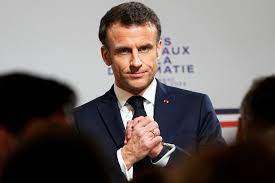France will withdraw its ambassador and end its military presence in coup-hit Niger.
As a consequence of the coup that deposed the democratically elected president, France will stop its military presence in Niger and recall its ambassador, according to President Emmanuel Macron’s announcement made on Sunday.
The declaration, according to the junta in Niger, is a “new step towards the sovereignty” of the nation.
“Neo-colonialist forces and imperialism are no longer permitted on our sovereign soil. It said in a statement that “the new age of collaboration, based on mutual respect and sovereignty, is now under way.
The statement was a severe blow to France’s strategy in Africa, even if it was anticipated given that French forces had recently been forced to leave neighboring Mali and Burkina Faso due to coups in those countries. In order to combat Islamic terrorist organizations, France has stationed hundreds of soldiers in the Sahel area at the request of African governments.
Since the July coup, France has kept some 1,500 soldiers in Niger. The new junta had repeatedly ordered its ambassador to leave, but France had consistently refused, claiming that it did not recognize the coup leaders as legitimate.
However, tensions between France and Niger, a former French colony, have risen lately, and Macron recently claimed that French diplomats were living in the embassy on military rations.
Macron’s remark comes after the coup leaders said earlier on Sunday that they were blocking French military and commercial aircraft from flying in Niger’s airspace in order for the new government to “retake total control of its skies and its territory.” Other foreign planes were not covered by the ruling.
The Associated Press was informed by Ali Sekou Ramadan, a supporter of ousted Nigeran President Mohamed Bazoum, that Bazoum asked Macron to recall Sylvain Itte as French ambassador “to reduce tension.”
Macron said that he talked to Bazoum on Sunday and informed him that “France has decided to bring back its ambassador, and in the coming hours our ambassador and several diplomats will return to France.” Macron made this claim in an interview with the France-2 and TF1 television networks.
And we will cease our military collaboration with the Nigerian government because they no longer desire to combat terrorism, he said.
He said that in conjunction with the coup leaders, the forces would be progressively withdrawn, most likely by the end of the year, “because we want it to take place peacefully.”
He said that at the time, the government of Niger had asked for France to send troops there. However, since the coup, that military collaboration between France and Niger has been halted. The junta commanders said that Bazoum’s administration wasn’t doing enough to save the nation from the uprising.
The junta is now under to sanctions from Western and African regional countries.
Local activist Insa Garba Saidou, who helps Niger’s new military rulers with communications, said that they would keep an eye on events until the French ambassador left the nation. Additionally, he asked that the French forces be withdrawn by a certain date.
“The triumph of the Niger people is announced by this statement from the French president. Because I no longer have faith in Mr. Macron, we will, nevertheless, approach it with great caution, Saidou added.
The French ambassador was given 48 hours to depart by the junta in August. The coup leaders canceled his diplomatic immunity after the time passed without France recalling him.
The military regime that took control of Niger on Friday accused UN Secretary-General Antonio Guterres of interfering with the West African nation’s full participation in the UN’s annual summit of global leaders in order to placate France and its allies.
According to experts, the time when France served as Africa’s “gendarme” may have finally come to an end after decades of military operations in its former colonies as the continent’s interests shifted.
In addition to acknowledging a “harsh reality for France in the region,” the decision, according to Andrew Lebovich, a research fellow at the Clingendael Institute, “may possibly put some limits on the U.S. deployments in Niger, though as we have seen, the U.S. and France have not followed exactly the same positionings in Niger.”
Niger would feel the loss of French backing in its battle against violent extremist groups, according to Rida Lyammouri, a senior fellow at the Policy Center for the New South, a research tank with offices in Morocco.
“France has been a reliable partner providing support to its operations, and Niger simply doesn’t have an alternative to fill this void by the French, at least in the short and mid-term,” Lyammouri said.
Following disagreements with the governing junta following the coup of 2020, Macron withdrew French soldiers from Mali last year. More recently, he removed them from Burkina Faso for similar reasons. The French military had been requested to withdraw by both African nations.
In addition, France halted military activities with the Central African Republic after accusing its leadership of failing to halt a “massive” misinformation campaign against France.







